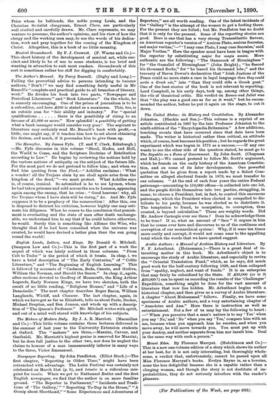Newspaper Reporting. By John Pendleton. (Elliot Stock.)—The first chapter, "Reporting
in Olden Time," might have been _retrenched with advantage. The Latin Festival was certainly not celebrated on March 31st (p. 9), and trisulw is a ridiculous mis- print for insar. When we get to Nathanael Butler and the first English newspaper, we find that the author is on more familiar ground. " The Reporter in Parliament," " Incidents and Tradi- tions of The Gallery,"' " Reporting To-Day in the House," "A Gossip about Shorthand," "Some Experiences and Adventures of Reporters," are all worth reading. One of the latest incidents of the "Gallery" is the attempt of the women to get a footing there. For the present they are foiled ; but Mr. Pendleton has no doubt that it is only for the present. Some of the reporting stories are good. Here is one that has a very strong Transatlantic flavour, an American reporter's versionof "Amicus Plato, amicus Socrates, sed major veritas,"-.-44 I may cuss Plato, I may cuss Socrates,' said Major Veritas." Here the speaker must have been in league with the reporter by substituting major for magic amiea. More authentic are the following : " The Gamecock of Birmingham" for "the Gamaliel of Birmingham" (John Bright) ; "he fleeced his thousand flocks," for " he leased his thousand lots ;" and the travesty of Baron Dowse's declaration that "Irish Justices of the Peace could no more state a case in legal language than they could write a Greek ode," into "than they could ride a Greek goat." One of the best stories of the book is not relevant to reporting. Lord Campbell, in his early days, took up, among other things, the rile of theatrical critic. His verdict on Romeo and Juliet was that " the play was a good one as far as it went," but he recom- mended the author, before he put it again on the stage, to cut it down.


















































 Previous page
Previous page